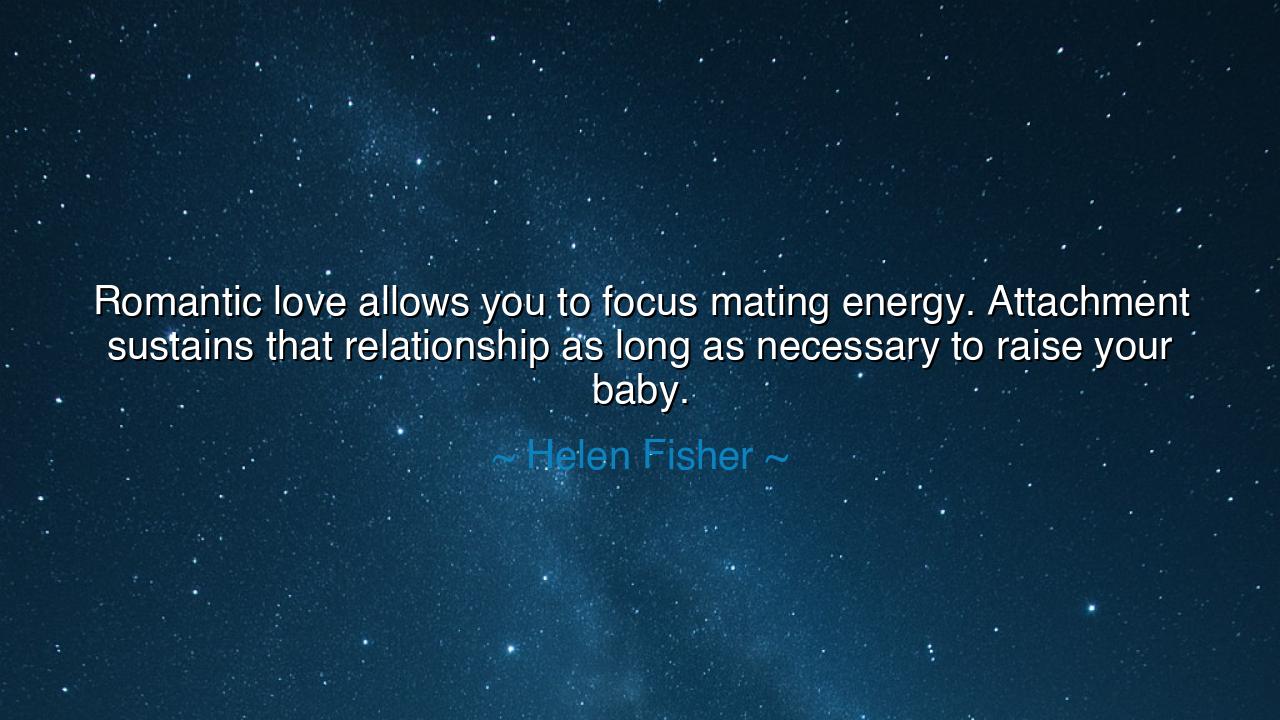
Romantic love allows you to focus mating energy. Attachment
Romantic love allows you to focus mating energy. Attachment sustains that relationship as long as necessary to raise your baby.






"Romantic love allows you to focus mating energy. Attachment sustains that relationship as long as necessary to raise your baby." These profound words by Helen Fisher point to a deep biological and evolutionary truth about the nature of romantic love and the attachment that follows. Romantic love, as Fisher suggests, is not simply a fleeting or idealized emotion, but a powerful force that serves a biological purpose. It is a tool to focus our mating energy, to help us connect deeply with a partner, and to ensure the continuity of our species. Once the bond of love is formed, attachment sustains the relationship, providing the necessary stability and commitment to raise the offspring we create, and ensure their survival and nurturing until they are strong enough to face the world.
In the ancient world, love was seen not only as a profound emotional experience but also as a force of nature, one that intertwined with fate and the survival of families and communities. The great epic of the Aeneid, written by Virgil, reveals that love was both a personal and a societal force. Aeneas, the hero of the story, is driven by love and duty. He is guided by the love for his family and his destiny to found Rome. His romantic love for Dido, the queen of Carthage, becomes a crucial chapter in his journey—a sacrifice he must make for the survival of his people. Aeneas’ love and attachment were not mere desires; they were forces that bound him to a greater purpose—the survival and flourishing of the generations that would come after him.
The power of romantic love in the ancient world was also seen in the story of Hera and Zeus, where love was not just about personal pleasure, but the foundation of the gods and the order of the universe. While their relationship was complex and marked by its own struggles, it represented the union of forces, where love played a critical role in creating and maintaining the order of the cosmos. Fisher’s observation about romantic love enabling one to focus mating energy aligns with the ancient belief that love was a bond that served the greater good—the continuation of life and the building of legacies that would endure across generations.
Consider the story of Cleopatra and Julius Caesar, whose love affair was driven not only by passion but by the political stability they could offer each other. Their relationship created alliances, shaped kingdoms, and ultimately ensured that their bloodlines would continue to shape the course of history. Though the love between them was undeniable, it was also bound by their duty to their people and the legacy they were creating together. Romantic love, like that between Cleopatra and Caesar, is not just about emotional fulfillment, but about the bonds that enable families to grow and societies to thrive.
As Fisher notes, attachment sustains the romantic relationship, not simply for the emotional bond but for the practical necessity of raising children. Attachment between two people enables them to share the burdens of raising offspring, ensuring the next generation has the stability and nurturing necessary to grow. In ancient times, the strength of familial bonds was paramount to survival. The attachment between Odysseus and Penelope, for example, shows that the loyalty between partners is not merely for companionship but for the sake of the family and the future. Penelope, who waited faithfully for Odysseus for twenty years, embodied the attachment necessary to raise their son, Telemachus, to adulthood. Her steadfastness ensured that the family would not break, even in the face of immense adversity.
This understanding of romantic love and attachment highlights the interdependence between personal desire and the survival of the community. The love between two people is not just for the joy it brings them, but for the sacrifice and commitment that ensures their child’s future. Romantic love provides the focus and energy to begin a family, while attachment is the force that holds the family together, making it possible for the child to grow and thrive. This bond is a profound partnership, one that demands both personal sacrifice and commitment to a shared purpose.
The lesson here is that romantic love and attachment are not just emotions to be felt, but forces to be understood. They are deeply tied to human survival and legacy, shaping the way we build and nurture our families, societies, and future generations. Romantic love allows us to focus our energy, while attachment ensures that we stay committed to the responsibilities that come with creating life. It is through these bonds that we find meaning and purpose, not only in our own lives but in the generational journey that connects us to the past and shapes the future.
To future generations, remember this: the love that you feel is not just about personal joy but about creating the bonds that sustain your legacy. Romantic love and attachment are the foundation of life itself, guiding you to be not just passionate, but also responsible and committed to those you love and the future you are shaping together. Embrace the power of attachment and understand that through this bond, you build the foundation for everything that follows. Through love, we are not only bound to each other in the present, but we ensure the survival of our children, our communities, and our legacy.






AAdministratorAdministrator
Welcome, honored guests. Please leave a comment, we will respond soon